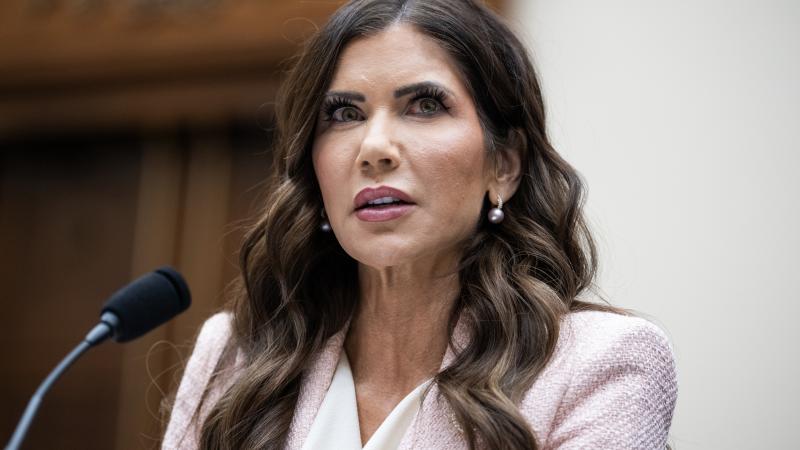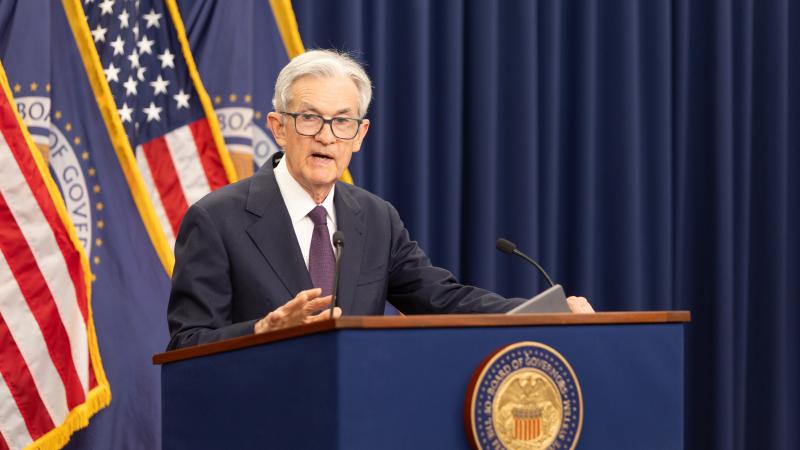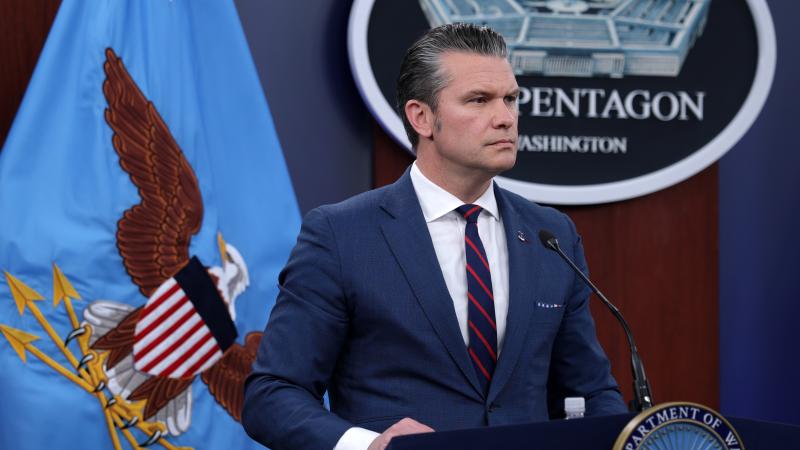Feds extorted social media to censor by threatening lucrative 'hidden subsidy': AGs lawsuit
New filings feature evidence related to interagency Global Engagement Center, which partnered with private consortium to mass-report purported election misinformation.
Congressional Democrats and White House officials cowed social media platforms into censoring disfavored narratives on COVID-19, elections and Hunter Biden by threatening "a hidden subsidy worth billions of dollars," according to documents filed Monday in a lawsuit against the Biden administration.
Suing under the First Amendment and the Administrative Procedure Act, the plaintiffs — the Missouri and Louisiana attorneys general joined by censored doctors — filed a supplemental brief in support of a motion for preliminary injunction and 364-page proposed findings of fact that cite depositions and internal communications of current and former officials in the FBI and Departments of Health and Human Services, Homeland Security, and State.
New Civil Liberties Alliance senior litigation counsel John Vecchione, who is representing the doctors, called it "the most comprehensive description linked to testimony and evidence of the federal government's massive pressure and control of social media companies to remove information, even true information that the government did not like, from the public square."
The new filings document "1,423 facts" about White House and federal agency officials coercing and colluding with social media platforms to censor speech, AGs Andrew Bailey and Jeff Landry said in a joint release.
A spokesperson for Landry told Just the News the new filings include previously undisclosed material related to the interagency Global Engagement Center (GEC) hosted by State, which is featured in the latest Twitter Files release.
The plaintiffs have previously made hay out of the 174 "I do not recall" answers given by Anthony Fauci, then director of the National Institute of Allergy and Infectious Diseases, during his deposition.
Several pages recount public statements by Democratic lawmakers, including direct warnings in congressional hearings with Big Tech executives, threatening to remove the liability shield for platforms in Section 230 of the Communications Decency Act and pursue antitrust enforcement, which Meta CEO Mark Zuckerberg has called an "existential" threat to his company.
House and Senate Judiciary Committee and House Commerce Committee hearings were rife with references to the "growing rise of misinformation and disinformation," "incendiary content" and "extremism" facilitated by platforms. Then-Rep. Bobby Rush (D-Ill.) went so far as comparing Google, Facebook and Twitter to the "slavetocracy" of America's past.
Only one Republican appears to be named, then-Michigan Rep. Fred Upton, who said "we're going to see some changes in Section 230" at the Commerce hearing.
The new filings cite a 2019 report by the University of Chicago business school that concludes Section 230 provides billions to Big Tech "not enjoyed by legacy media entities" that face "more legal exposure" for their content.
President Biden has "tripled down on these threats of adverse official action" starting in his campaign, when he said it's "possible" Zuckerberg should face criminal sanctions for not censoring campaign ads criticizing Biden, the plaintiffs say.
White House aides from the start of Biden's presidency issued "arrogant, demanding, and peremptory" censorship demands that "continued relentlessly," according to the proposed findings. Even quick responses and pledges to ramp up censorship were "not nearly enough for the White House," as when aide Rob Flaherty grilled Facebook for weakly saying only that users "may" be removed for repeatedly sharing "debunked claims," prompting further groveling from Facebook.
A senior Meta executive "repeatedly copied" White House COVID adviser Andy Slavitt on emails to Surgeon General Vivek Murthy for several weeks in 2021 elaborating on the platform's censorship of purported misinformation at White House direction, the proposed findings say.
The filing paraphrases and quotes from depositions of Fauci, Murthy adviser Eric Waldo, CDC public affairs official Carol Crawford, FBI Special Agent Elvis Chan and GEC Principal Deputy Coordinator Daniel Kimmage.
Fauci "orchestrated an elaborate campaign of trickery and deception to induce social media platforms to censor the lab-leak theory and other viewpoints he disfavors," the proposed findings claim, deeming dozens of his deposition responses "not credible."
It contrasts his "I do not recall" answers on questions related to COVID origins in 2020 with other disclosures. Fauci's subordinate "flagged" the agency's grant to the EcoHealth Alliance, a collaborator with the Wuhan Institute of Virology, on Jan. 27, and Fauci was on a "first-name basis" with EcoHealth President Peter Daszak and joined him on a Feb. 9 podcast to discredit the lab-leak theory.
Fauci also shared a 2015 Nature Medicine paper describing NIAID-funded gain-of-function research on bat coronaviruses in a "confidential midnight email" Jan. 31 to another NIAID official, the filing says.
Based on his conversations with social media platform employees, Chan believes they were "far more aggressive in taking down disfavored accounts and content in the 2018 and 2020 election cycles" than in 2016 because of pressure from the House and Senate Intelligence committees, in the filing's paraphrase.
In his own words, Chan characterized those congressional hearings as resulting in "constructive changes" to stop purported Russian disinformation.
The filing portrays a Federal Election Commission declaration by Yoel Roth, then Twitter's head of trust and safety, as more credible than Chan's deposition on "key discrepancies" in Twitter's meetings with the feds to discuss the threat of "hack-and-leak operations."
Roth said FBI and national security officials told Twitter they "expected" such an operation from Russia or other "state actors," while Chan said they had "concern[s]" it could happen. Federal officials cited "rumors" that an operation would involve Hunter Biden, according to Roth, while Chan said the president's son wasn't mentioned.
Not only did Roth's testimony come about two years earlier than Chan's, but Roth "had no incentive to color or shade his account," while Chan has "strong incentives" to push back against the "compelling inference that the FBI deliberately gave misleading information" to Twitter and others so they would censor reporting on Hunter Biden's abandoned laptop.
According to the plaintiffs' account drawing on witness depositions and obtained communications, GEC's Kimmage portrayed the interagency group's work as equipping tech companies to "better understand" disinformation "so that they can take whatever actions they would take to stop the spread."
The center's senior leadership met with content moderation teams for social media platforms roughly quarterly to discuss "tools and techniques" of disinformation but rarely specific content, while GEC's Technology Engagement Team and Silicon Valley liaison had more frequent meetings with them, Kimmage said.
GEC had a "general engagement" with the Election Integrity Partnership (EIP), which mass-reported purported election misinformation in the 2020 and 2022 cycles, through at least one and possibly two officials, Kimmage said.
Secretary of State Antony Blinken answered a question at a Stanford University event in October about the two entities' cooperation to fight "propaganda," according to a Kimmage exhibit. The Stanford Internet Observatory co-leads the EIP.
Blinken said State was "build[ing] out" partnerships with Stanford to facilitate the department's "day-in, day-out battle" against "misinformation and disinformation around the world." GEC's work, he said, is "inspired" by academia's work and it seeks "partnerships to make sure that we're looking at every place that is actually developing answers."
The Facts Inside Our Reporter's Notebook
Documents
Links
- supplemental brief for a sought preliminary injunction
- proposed findings of fact
- latest Twitter Files release
- 174 "I do not recall" answers given by Anthony Fauci
- Meta CEO Mark Zuckerberg has called an "existential" threat
- Michigan Rep. Fred Upton
- 2019 report
- discuss the threat of "hack-and-leak operations."















